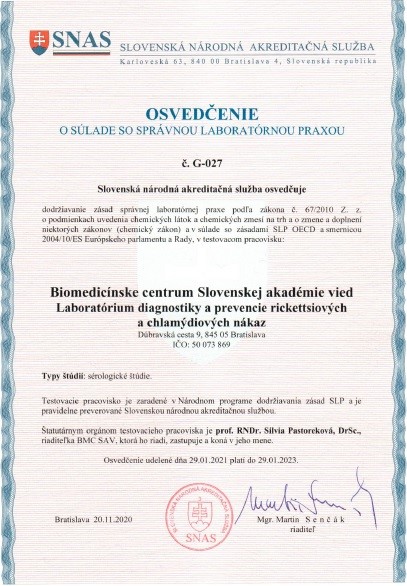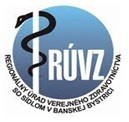Laboratory for Diagnosis and Prevention of Rickettsial and Chlamydial Infections
Laboratory for Diagnosis and Prevention of Rickettsial and Chlamydial Infections includes 2 laboratories:
- Laboratory for Diagnosis and Prevention of Rickettsial and Chlamydial Infections and
- The laboratory (No. G-027) operating under the supervision of the Slovak National Accreditation Service.
The laboratory (No. G-027) operates according to Act No. 67/2010 Coll., (Chemical Act) and the directive 2004/10/EC of the European Parliament under the supervision of the Slovak National Accreditation Service, which verifies compliance with the principles of Good Laboratory Practice. In accordance with these principles, the laboratory carries out development and non-clinical testing of antigens developed and produced in vitro, for simple, fast and sensitive serological diagnosis.

The Laboratory located in the premises of the Institute of Virology BMC SAV, v.v.i. operates a biosafety level 3 facility which enables the development of experimental vaccines against coxiellosis and chlamydial infections in livestock, goats or sheep and produce diagnostic antigens or sera for the simple, rapid and reliable diagnosis of these etiological agents. Especially in the field of Q fever diagnosis, a whole range of products are available to enable a wide range of serological tests at the highest sensitivity. Our laboratory provides also advisory and technical assistance.
DIAGNOSTIC ANTIGENS
Coxiella burnetii phase I or II antigens for diagnostics of Q-fever
A white or slightly yellow suspension of highly purified Coxiella burnetii phase II cells in phosphate – buffered saline with thiomersal as a preservative. Suitable for serological screening and surveillance of Coxiella burnetii antibodies in blood serum samples of humans or animals by complement fixation (CF) test or enzyme-linked immunosorbent assay (ELISA). A sediment can be formed after a longer period of storage which can easily be resuspended by shaking.
Chlamydophila psittaci antigens for diagnostics of psittacosis
A white or slightly yellow suspension of highly purified Chlamydophila psittaci cells in phosphate – buffered saline with thiomersal as a preservative. Intended for serological screening and surveillance of Chlamydophila psittaci antibodies in blood serum samples of humans or animals by the complement fixation (CF) test or enzyme-linked immunosorbent assay (ELISA). A sediment can be formed after a longer period of storage which can easily be resuspended by shaking.
SERA
- Hyperimmune rabbit serum containing specific antibodies against burnetii. Preservative: sodium azide.
- Hyperimmune rabbit serum not containing specific antibodies against burnetii. Preservative: sodium azide.
- Hyperimmune rabbit serum containing specific antibodies against Chlamydophila psittaci. Preservative: sodium azide.
- Hyperimmune rabbit serum not containing specific antibodies against Chlamydophila psittaci. Preservative: sodium azide.
EXPERIMENTAL VACCINES
- An experimental vaccine against coxiellosis in cattle, goats, and sheep
- An experimental vaccine against ovine enzootic abortion
Executive Laboratory of National Reference Center for Rickettsioses
The laboratory arose from the former WHO Collaborating Center for Rickettsial References and Research in Bratislava that was discontinued in 2010. The executive laboratory provides specialized laboratory diagnostics of tick-borne bacteria, especially from the genera Rickettsia, Borrelia, Anaplasma, Ehrlichia, Babesia, and Bartonella in Slovakia and the antibodies they induce. It maps natural foci of these microorganisms and elucidates their epidemiological and epizootological aspects in relation to developed human infection, vectors, and reservoirs.

You can find more detailed information about the activity of the laboratory at RÚVZ
The laboratory also provides services for the general public – analyzes of the presence of infectious disease agents in ticks. You can find the ORDER form HERE.
Please send the completed application to the e-mail: analyzakliesta@gmail.com and deliver the sample to the Laboratory according to the instructions given in the “Order”.







